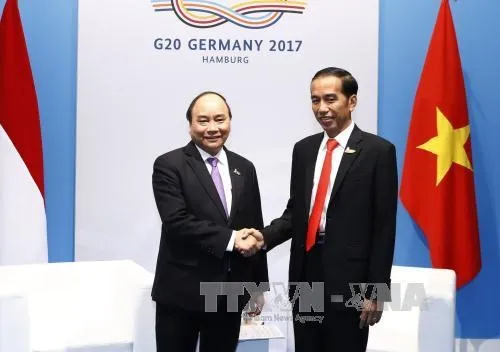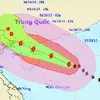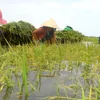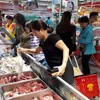Vietnam - APEC to G20 in an uncertain world


Leaders of G20 Summit 2017 (Source: vietnam.vn)
Earlier this month, Germany hosted one of the most important summits attended by the world’s 20 leading industrialised and emerging economies in Hamburg. The underlying goal of the G20 from the very beginning is to act as an arena for major powers to trade and interact with each other, to become ‘responsible stakeholders’ and together alleviate common challenges despite inherent differences. And G20 was successful for a while, until it is not anymore. This year, G20 in Hamburg faced thousands of demonstrators protesting against an elitist, capitalist, undemocratic forum, aiming to display their discontent with the ineffectiveness of the forum in tackling climate change and ensuring global equality. Furthermore, this year summit witnessed a clear division among the G20 countries. The US, by abandoning the consensus to fight global warming, set itself in opposition of the rest 19, turning G20 in what the pressed termed G19 + 1. The withdrawal of the U.S from its global leadership role could present an opportunity for countries to better coordinate and form closer ties, but it could be the beginning of the disintegration of the international community, evidently in President Erdogan’s statement that he would re-evaluate Turkey’s participation in the Paris accord as the US’s withdrawal could jeopardise funding for less-wealthy countries. In a summit entitled “Shape an interconnected world”, the future doesn’t seem so interconnected.
That is the political climate the world is in right now, and it’s the political climate in which Vietnam was able to assert its leadership. Despite not being a member of the G20, Vietnam was invited to attend the summit as a representative of the Asia-Pacific Economic Cooperation and made important contribution to the discussion on trade liberalisation and globalisation, climate change adaptation. Prime Minister Nguyen Xuan Phuc delivered a speech in which he underlined the importance of strengthening cooperation to cope with climate change and called on G20 countries and the international community to uphold responsibility, strictly implement international commitments and enhance financial and technological support for developing countries to achieve sustainable and inclusive developmental goals. It’s critical to tackle climate change head-on, Mr. Phuc said, because Vietnam, like many other coastal countries, is vulnerable to sea-level rise. He encouraged better cooperation between G20 member economies and APEC members, and boost talks on various aspects.
More importantly, while Vietnam’s efforts in fostering inter-regional cooperation at G20 summit are noteworthy, Hamburg also opened up an opportunity for Vietnamese leaders to engage in bilateral meetings with potential partners and strengthen existing ones. It was reported that Deputy PM Pham Binh Minh had met with leaders from Hamburg state of Germany to talk about the possibility of future investment in Vietnam in shipbuilding, petrochemistry, aviation-aerospace, electronics, precision mechanics, chemicals and optical equipment. They also look forward to cooperation in seaport management, planning and development with port cities of Vietnam like Da Nang, Hai Phong, and Ho Chi Minh. Hamburg is an important trade partner to Vietnam because it’s a major gateway for Vietnamese goods to enter Germany and Europe. Indeed, the number of containers from and to Vietnam through the Hamburg port has increased 50% in recent years. Germany has proved to be Vietnam’s top partner in the EU after the two countries establishing a strategic partnership in 2012. It’s expected that after G20 2017 Summit and APEC 2017 where Germany was also invited to attend by Mr. Phuc, bilateral trade will soon increase; comprehensive cooperation in other areas like culture-exchange and education will take place.
PM Nguyen Xuan Phuc also held bilateral meetings with some of Vietnam’s most long-running partners – Korean President Moon Jae In, Australian Prime Minister Turnbull and Indian PM Modi. These meetings occurred at a time when the situation in the South China Sea is facing gridlock and Sino-Indian relations also deteriorated due to border tension. Regarding the SCS situation, Australian and S. Korean leaders share Vietnam’s views on the importance of freedom of sea line and airline navigation, as well as dispute settlement mechanism in accordance to international law. Both Australia and South Korea have prominent military presence in the Asia Pacific, SK in East and South China Sea, and Australia in the Strait of Malacca that connects the Indian Ocean to the Pacific, which make closer ties with them one of Vietnam’s strategic necessity. Additionally, Vietnam-India bilateral relationship is exepected to be enhanced for mutual security. According to Reuters, in Vietnam-India meeting in Hamburg, Vietnam has extended an Indian oil concession in the SCS. The project to explore oil block 128 was granted to an Indian oil firm ONGC Videsh, part of which is once again in the ‘nine-dash line’ claimed by China. We can expect that this decision will, first of all, provoke backlash and military reaction from China, but at the same time, drive India and Vietnam to seek further military cooperation in order to protect their rights of exploration in SCS.
One one hand, G20 Summit has proved to be an occasion for Vietnam to demonstrate its growing confidence in handling with international fora. It has represented APEC successfully and fulfilled its responsibility as a message carrier to G20 countries. Vietnam, as chair of APEC 2017 to be held in November acted as a bridge between western countries in the G20 and southeast Asian ones in APEC, hopefully setting common grounds for future policy coordination. Therefore, Vietnam promises to hold the key for comprehensive partnership among member countries in trade and economic sphere.
On the other hand, through its skillful diplomacy, Vietnam has taken advantage of such an event to pursue its goal of diversification of external relations. Vietnamese leaders have engaged in meaningful dialogues with its partners and hopefully these ties can contribute somewhat to Vietnam’s prosperity and security in the future.
Tags:





